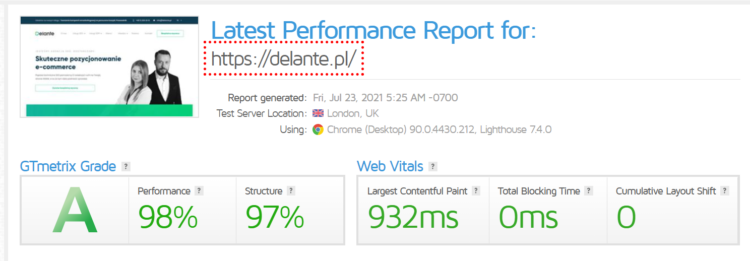5 Elements That Affect Your Website Speed

Website speed can be a factor in deciding if users will stay on your website and eventually convert. If you’re wondering what’s there to optimize for faster loading – keep reading and find out 5 elements that affect website speed!
Table of contents:
- Why Should You Care About Your Website Speed?
- 5 Elements that Have an Impact on Website Speed
- How To Check Your Website Speed?
Have you ever wondered why your website isn’t running as fast as it should be? Perhaps you’re looking to take preventative measures and you’re intrigued to learn what factors can affect performance?
If you can relate to either of these sentiments, you’ve come to the right place. Read on to discover more information about different elements that can affect the speed of your website.
But before we get to that, let’s begin by looking at why you should care about your website speed.
Why Should You Care About Your Website Speed?
Page speed is one of the more important factors when it comes to Google’s search engine rankings. The significance of page loading times has increased dramatically in line with evolving consumer expectations.
Neglecting the importance of page loading speeds can lead to undesirable outcomes like cart abandonment and an increased bounce rate. After you’ve worked hard to get visitors to your website, one of the last things you’ll want to do is send them away due to a slow user experience.
This is a problem that’s easily fixed if you know what elements can have an impact on website speed, and how you can overcome associated difficulties to improve loading times.
5 Elements that Have an Impact on Website Speed
Without any further ado, here are five elements that can affect website speed:
Server and Hosting
The server you choose to host your website is a huge consideration when it comes to loading speeds, despite often being overlooked. So, what features will determine the speed of your website?
Well, you should first consider a plan that provides Solid State Drives (SSDs). You should also choose a hosting plan that provides enough RAM, where usually 2GB is enough if you get lighter traffic. If you require more, you should look into this when you sign up to your host.
The last thing to consider is bandwidth, which reflects how much data your web host can transfer. The more restricted your bandwidth is, the longer data will take to transfer and the slower your website will load. You should calculate how much bandwidth you’ll need by using expert guidance to determine the right hosting plan for you.
Files Sizes and Types
The larger the file sizes are on your website, the longer your website will take to load. One way to overcome this issue is to optimize the files on your website, which will consequently reduce loading speeds considerably.
One way this can be achieved is by minifying your code while optimizing image sizes and formats so your files are lean. If these processes are too technical for you to execute, a web developer will be better equipped to resolve issues.
The other option is to implement a lazy loading solution on your website. This way images will load only when user will reach that part of the website images are included, instead of loading all pictures at once. It can significantly shorten the time needed to enter your site. Read more about this solution in our article: Lazy Loading – What Is It and How Does It Affect SEO?
Website Add-Ons
Add-ons are often incorporated within websites to increase functionality. However, it’s important to realize how they can consume system resources and lead to website visitors experiencing slow loading times.
When an add-on has to load so does the plug-in that’s associated with it. This can delay loading within your prospective customer’s browsers, which is why it’s important to remove any unnecessary add-ons accordingly. Choose your add-ons wisely, and most importantly, disable any that don’t bring value to the consumer experience.
Traffic Volume
If you’re receiving a substantial volume of traffic to your website, this can have an adverse effect on loading speeds. Naturally, if your server can’t handle the volume of traffic you’re getting, loading times will suffer as a consequence.
As referenced earlier, if your website is receiving a light volume of traffic, 2GB of RAM will be substantial. As your website traffic increases, you should consider changing your hosting package to accommodate the additional traffic you’re receiving.
It’s worth communicating with your hosting provider to determine a package that ensures maximum speed, while monitoring website traffic to work out whether you need to upgrade your RAM.
Poor Coding
Some of the most common culprits affecting website speeds are CSS and JavaScript files. These are often added to improve functionality, but end up becoming an issue regarding above-the-fold content.
One way to avoid the problems this issue presents is by transferring the tracking code and scripting to a below-the-fold location. You can work out whether your coding is affecting your website’s performance by using an advanced tool like Google PageSpeed Insights to evaluate what’s affecting loading speeds.
How to Check Your Website Speed
Here are a few tools that will help you check your website speed and offer insight to identify and resolve any issues:
- KeyCDN Website Speed Test: Quickly monitor how many HTTP requests were made, loading time, and the full size of the page you’re requesting.
- Google PageSpeed Insights: This advanced tool grades your website on a scale of 1 – 100. Any score above 85 will indicate your website is performing well and thus loading at an efficient rate. You can also identify how to fine-tune performance on your website, by receiving detailed reports which highlight areas of improvement.
- Pingdom Speed Test: This renowned speed test will give you reports which are divided into sections including performance grade, history, waterfall breakdown, and page analysis.
- GTmetrix: Your site will be graded from F to A, with reports covering metrics from Google’s waterfall breakdown, Lighthouse tool, video, and history.
- WebPageTest: This tool will grade your website similarly to GTmetrix (F to A), but establish grading based on performance tests like caching, compression, effective use of a CDN, and FTTB.
Summary
Maintaining effective loading speeds is a huge consideration when creating a website for public consumption. If a visitor leaves your website due to slow loading times, you will have committed a cardinal business sin. If you do everything within your power to ensure fast loading times, you’ll have a much greater chance of converting visitors into paying customers.
When someone can effortlessly browse your web pages, they’ll be more inclined to continue browsing your website and ultimately advance to the checkout stage. You’d be amazed by how fast loading speeds can increase sales, so neglect its importance at your peril!




